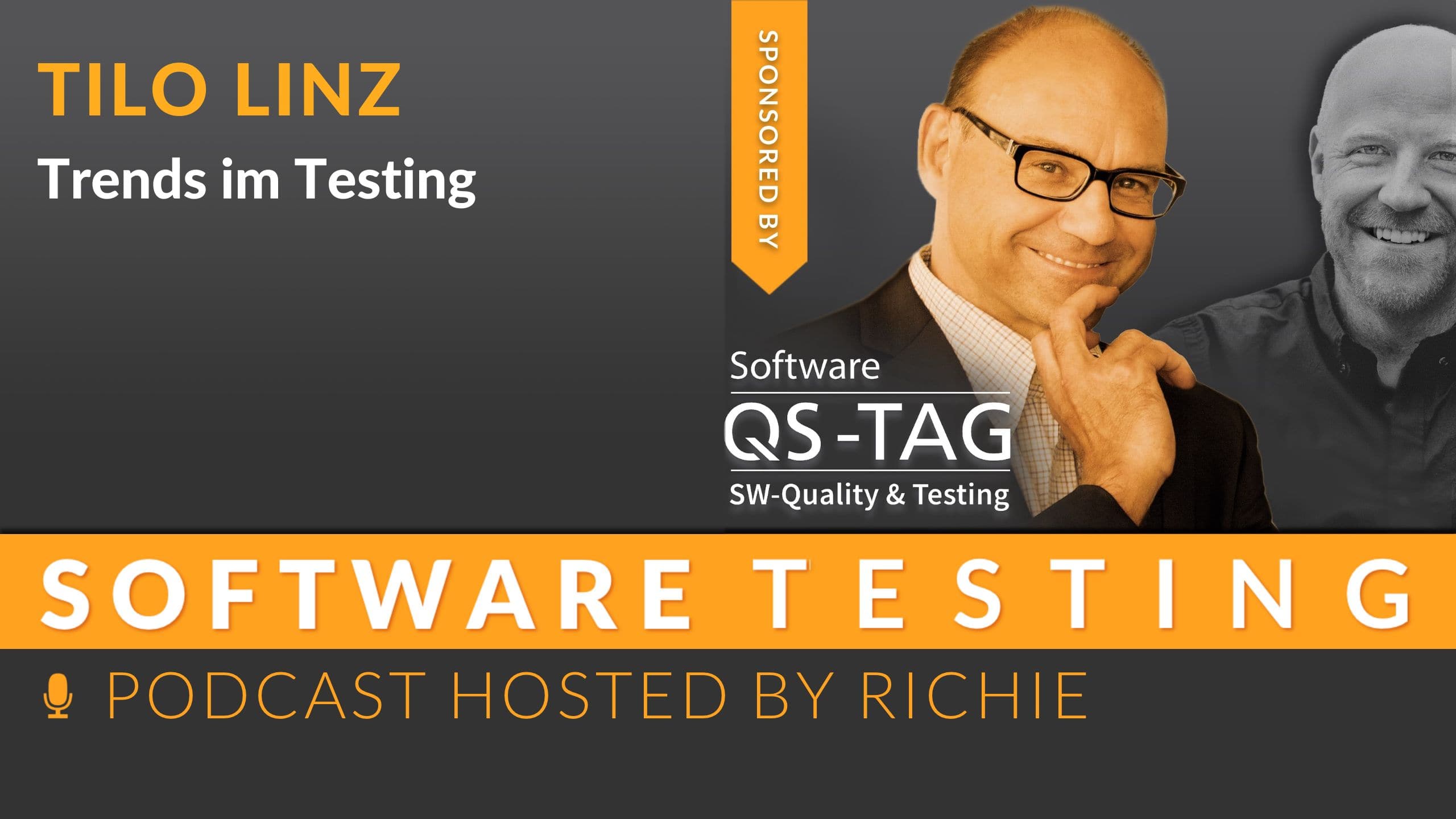World Quality Day
World Quality Day provides an opportunity to take a look at the development of software quality and the changes in software testing over the last 20...

The past year in software testing was characterized by central topics such as artificial intelligence (AI) and accessibility. Legislation such as the EU Accessibility Act and the Cyber Resilience Act play a key role here, as they act as driving forces for further development. AI is increasingly being used in the field of testing, whereby it is important to strike a balance between human expertise and machine support. Going forward, these trends and participation in specialist conferences will remain important aspects in driving innovation and best practices forward.
In our special New Year’s Eve episode, I sat down with Florian Fieber to review the past year and take a look into the future. We talked about the many conferences Florian attended and the dominant topics such as artificial intelligence (AI) and accessibility. Florian emphasized the importance of legislation such as the EU Accessibility Act and the Cyber Resilience Act, which act as drivers for the topics. We also discussed how AI is used in testing and the need for a balance between human expertise and machine assistance. Finally, we shared our plans for the next year, including more conferences and our work at ISTQB. It was a great conversation and a perfect way to end the year.
“The meta-topic at all corners and ends was of course AI, yes, testing of and with AI completely thought through. There are also the first formats, or actually some of them already, that are really exclusively concerned with testing with AI or by AI.” - Florian Fieber
Florian Fieber studied Media Informatics and Information Systems, after which he worked as a software developer and research assistant. Today, his area of expertise covers all aspects of quality assurance in the software lifecycle, with a focus on test management and process improvement. Since 2018, he has been active in the German Testing Board e.V. (GTB), where he is, among other things, head of the Acceptance Testing working group and has served as chairman of the GTB since 2022.
In 2023, the focus was on numerous conferences in the field of software quality and testing. The most important events included the Software Quality Days in Vienna, the German Testing Day, TACON in Leipzig and Testing United. These events provided an ideal platform for exchanging information on current trends and discussing new developments in the industry. The topic of artificial intelligence (AI) in particular was omnipresent and played a central role in presentations and discussions. The focus was on both the testing of AI systems and the use of AI to optimize test processes.
Artificial intelligence has long been a key topic in the testing community. Various events, such as the SIX Info Days or Testing United, were dedicated entirely to the potential and challenges of dealing with AI. The focus was on how AI can be tested, but also how it can make testing processes more efficient. One key aspect was the combination of human expertise and machine intelligence: AI does not act as a replacement for good testers, but rather complements and strengthens their skills.
Accessibility was another important topic of the year, particularly in the context of the forthcoming EU Accessibility Act. This promotes the development of accessible applications and has greatly increased interest in accessibility testing. Legal requirements are often a catalyst for innovation, and so the topic of accessibility has become the focus of many discussions and projects. Companies are faced with the challenge of making their applications accessible to all users, which requires extensive testing and specialized approaches.
In addition to accessibility, cyber security and the Cyber Resilience Act are also key issues in the testing sector. These new regulations require companies to carry out more stringent tests to ensure the security of their products. Such requirements not only pose challenges, but also offer opportunities, as they focus on essential quality aspects and promote innovation in the area of product safety.
A look into the future shows that artificial intelligence will remain a dominant topic. The integration of AI into test processes is likely to normalize, and the tools for testing AI systems will be further developed. In addition, topics such as DevOps, quality engineering and agile methods are becoming increasingly important. Low-code and no-code platforms for test automation also promise to further simplify and accelerate the testing process. Progress in these areas will have a lasting impact on the way the testing community works and open up new opportunities.
Data protection and security play a central role in current software quality trends. In the face of growing cyber threats and stricter regulations, software solutions must integrate data protection and security aspects from the outset. Users expect their data to be protected, leading to a leap of faith in products. A lack of security can not only have legal consequences, but can also jeopardize a company's reputation. Therefore, security checks and data protection measures are crucial to ensure software quality and meet user expectations.
The growing complexity of software systems poses a major challenge for quality assurance. It increases the risk of errors as more components and interactions need to be tested. In addition, the integration of new technologies such as AI and cloud services requires extended test methods. In addition, the traceability of requirements is more difficult, which can affect the assurance of software quality. In the context of current software quality trends, agile practices and automated testing must be increasingly used to effectively address these challenges.
The shortage of skilled workers has a direct negative impact on software quality and software testing. Fewer qualified testers can lead to lower test coverage and higher susceptibility to errors. Companies are often forced to introduce automated testing to compensate for the shortage, which is efficient but also poses new challenges. This development is influencing current software quality trends, as the focus is increasingly on efficiency and speed rather than thorough quality assurance. This can lead to customer dissatisfaction and higher costs in the long term.
Testing mobile applications is crucial for ensuring user satisfaction and software quality. Due to the increasing use of smartphones and tablets, mobile apps are often the first point of contact with companies. In the current software quality trends, testers are focusing on performance, usability and security to meet the high expectations of users. Careful testing can also prevent negative reviews and potential financial losses, further increasing the relevance of testing.
The integration of quality assurance into the entire development cycle is becoming increasingly important, as it identifies problems at an early stage and increases efficiency. At a time when software quality trends are subject to dynamic change, it is crucial to incorporate quality from the outset to save time and costs. This promotes faster time-to-market and improves user satisfaction. A holistic approach enables continuous feedback, allowing adjustments to be implemented quickly. This keeps the product competitive and meets the increasing demands of users.
Test environment simulation improves software quality by creating realistic conditions under which applications are tested. Current software quality trends in green computing focus on efficiency and resource conservation. Simulations allow developers to minimize energy consumption during testing while identifying potential errors at an early stage. This leads to more energy-efficient software solutions and reduces the ecological footprint, which benefits both the quality of the software and sustainability goals.
Artificial intelligence and machine learning are revolutionizing software quality by making automated testing, error detection and performance analysis more efficient. Predictive analytics can identify potential problems at an early stage, making software development faster and more reliable. In addition, intelligent algorithms enable personalized user experiences and adaptive systems that can easily adapt to changing requirements. This significantly increases the overall quality of the software.
Web accessibility is crucial in order to provide all users with access to information and services. It promotes inclusion and improves usability, which has a positive impact on software quality. In current software quality trends, accessibility is an important aspect as it combines legal requirements and social responsibility. Companies that offer accessible solutions increase their reach and improve the user experience, which leads to greater customer satisfaction in the long term.
Low-code and no-code platforms have a significant impact on software quality trends by shortening development time and encouraging the participation of non-programmers. This can lead to faster delivery of applications, but also poses risks in quality assurance as not all users have technical knowledge. Effective testing strategies and automated tools are becoming essential to ensure software quality. In addition, the trend towards collaboration between business departments and IT encourages rapid iteration, which drives innovation, but also requires controlled standards to ensure consistent software quality.
For 2025, the most important software quality trends in software testing are the increased use of AI and automation to increase efficiency and accuracy. Cloud-based test solutions enable flexible test management and continuous integration. In addition, test-driven development (TDD) is becoming increasingly important in order to identify errors at an early stage. Agile methods promote rapid adaptability, while security testing functions are increasingly being integrated to proactively detect threats. These trends help companies to sustainably improve software quality and meet the growing demands of the market.

World Quality Day provides an opportunity to take a look at the development of software quality and the changes in software testing over the last 20...

Unfortunately, the acceptance test is often seen as the final test stage. If many errors are then found, the excitement and the amount of work...

The further development of software testing is increasingly characterized by artificial intelligence (AI). Two key areas can be distinguished: the...